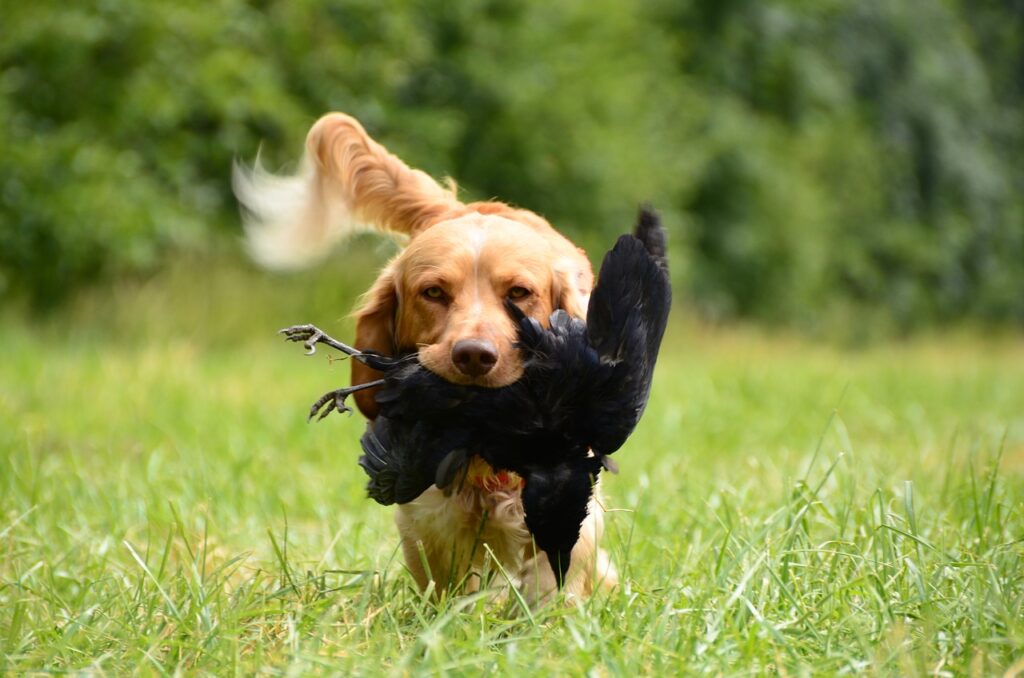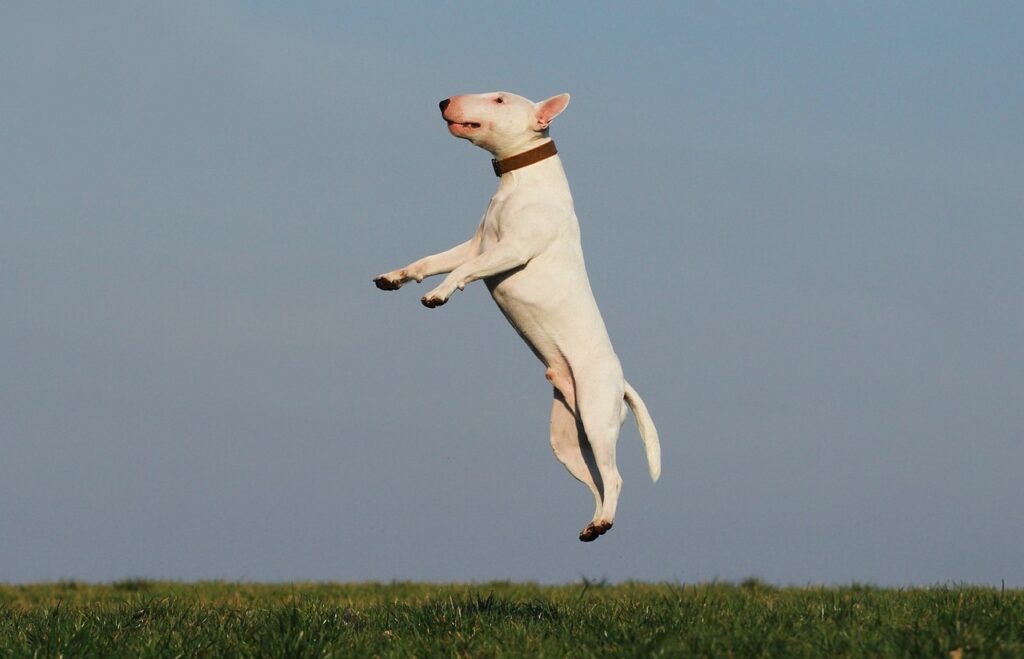
If you’ve ever found yourself wondering why your furry friend seems to have an excess of energy, fret no more – the answer to the age-old question, “Why is my dog hyperactive?” may finally be at hand. In this article, we’ll explore some common reasons why dogs might exhibit hyperactive behavior, offering insights and suggestions to help you better understand and manage your four-legged companion’s energetic bursts. So, get ready to uncover the hidden factors behind your pup’s boundless enthusiasm and discover ways to keep them happy and healthy.

Physical Exercise
Physical exercise is crucial for maintaining the overall well-being of your dog. Lack of physical exercise can contribute to hyperactivity in dogs. Dogs are bred to be active animals, and without regular exercise, they can become restless and develop excessive energy that needs to be released. It is important to provide your dog with opportunities for physical activity to help them expend their energy in a healthy way. Regular walks, playtime, and engaging in activities such as agility training or swimming can help keep your dog mentally and physically stimulated.
Lack of Physical Exercise
One of the primary reasons why your dog may be hyperactive is due to a lack of physical exercise. Dogs require regular exercise to stay healthy and happy. Without enough physical activity, they may become bored and restless, leading to hyperactive behavior. It is important to make time for daily walks or engage in other forms of physical exercise with your dog to help them burn off excess energy. This can help reduce hyperactivity and promote a calmer demeanor.
Insufficient Mental Stimulation
In addition to physical exercise, dogs also need mental stimulation to keep their minds engaged and prevent hyperactivity. Mental stimulation can come in the form of puzzle toys, obedience training, scent games, or interactive play. Dogs are intelligent creatures, and if their minds are not adequately stimulated, they may become hyperactive as a way to seek attention or relieve boredom. Incorporating mental exercises into your dog’s daily routine can help keep them mentally satisfied, reducing the likelihood of hyperactive behavior.
Overstimulation
While lack of physical exercise and mental stimulation can contribute to hyperactivity, it is also important to note that overstimulation can have the same effect on dogs. Some dogs are more sensitive to stimuli and can become overwhelmed by their surroundings or certain activities. Overstimulation can lead to hyperactive behavior as a way for dogs to cope with their heightened arousal levels. It is crucial to recognize your dog’s limits and provide them with a calm and quiet environment when needed. Avoid exposing them to excessive noise, crowded places, or overly stimulating activities to prevent hyperactivity.
Breed Characteristics
The breed of your dog can also play a significant role in their energy levels and propensity for hyperactivity. Certain breeds, such as Border Collies or Australian Shepherds, have been selectively bred for their high energy and working drive. These breeds often require more physical exercise and mental stimulation than others to prevent hyperactivity. Understanding your dog’s breed characteristics can help you tailor their exercise and mental enrichment needs accordingly. If you have a high-energy breed, consider incorporating activities such as agility training or regular fetch sessions into their routine to help them burn off excess energy and reduce hyperactivity.
Health Issues
While behavioral and environmental factors are common causes of hyperactivity in dogs, it is essential to consider underlying health issues that may contribute to this behavior. Several medical conditions can result in hyperactivity or increased restlessness in dogs.
Hyperthyroidism
Hyperthyroidism is a condition characterized by the overproduction of thyroid hormones. Dogs with hyperthyroidism may exhibit symptoms such as increased activity levels, restlessness, and hyperactive behavior. If you suspect that your dog’s hyperactivity is due to a thyroid imbalance, it is important to consult with a veterinarian for proper diagnosis and treatment.
Anxiety Disorders
Just like humans, dogs can experience anxiety disorders that can contribute to hyperactivity. Dogs with anxiety may exhibit symptoms such as excessive panting, pacing, and restlessness. It is essential to identify the underlying cause of your dog’s anxiety, whether it be separation anxiety, fear of specific stimuli, or generalized anxiety, and work with a veterinarian or professional trainer to develop a management plan that addresses their specific needs.
Acute or Chronic Pain
Dogs experiencing acute or chronic pain may display hyperactivity as a response to discomfort or distress. Pain can manifest in various ways, such as limping, vocalization, or changes in behavior. It is crucial to monitor your dog for any signs of pain and seek veterinary care if you suspect they are experiencing discomfort. Proper pain management can help alleviate their hyperactivity and improve their overall quality of life.
Food Allergies
Food allergies or sensitivities can also contribute to hyperactivity in some dogs. When dogs consume food that they are allergic to, it can lead to gastrointestinal issues and increased restlessness. If you suspect that your dog’s hyperactivity is related to food allergies, consult with a veterinarian to determine the most appropriate diet for your pet and to rule out any other underlying health conditions.
Behavioral Factors
In addition to physical and health-related factors, certain behavioral issues can contribute to hyperactivity in dogs. Understanding and addressing these factors can help manage and reduce hyperactive behavior in your canine companion.
Lack of Training
A lack of training can result in hyperactivity in dogs. Without proper obedience training and boundaries, dogs may engage in impulsive and hyperactive behaviors. It is crucial to invest time and effort into training your dog to understand basic commands, rules, and boundaries. Training not only helps establish clear communication between you and your dog but also provides mental stimulation, which can tire them out and reduce hyperactive tendencies.
Separation Anxiety
Separation anxiety is a common behavioral issue that can cause hyperactivity in dogs when left alone. Dogs with separation anxiety may exhibit destructive behavior, excessive barking, or hyperactive behavior as a response to the stress of being separated from their owner. Implementing strategies such as gradual desensitization, crate training, or consulting with a professional trainer can help manage separation anxiety and reduce hyperactivity.
Fear or Phobia
Fear or phobia of certain stimuli or situations can also contribute to hyperactive behavior in dogs. Dogs may become hyperactive as a way to cope with their fear or attempt to escape from the perceived threat. Identifying and providing proper desensitization and counterconditioning techniques can help alleviate their fear and subsequently reduce hyperactivity.
Attention-Seeking Behavior
Some dogs may exhibit hyperactive behavior as a way to seek attention from their owners. They may engage in behaviors such as jumping, barking, or running around to get your attention. It is important to establish clear boundaries and provide attention and interaction when your dog is calm and well-behaved. When your dog engages in hyperactive behavior for attention, it is best to ignore their behavior and reward calm behavior instead.
Environmental Factors
The environment in which your dog lives can have a significant impact on their behavior and energy levels. Various environmental factors can contribute to hyperactivity in dogs.
Boredom or Loneliness
Dogs that are bored or lonely may exhibit hyperactive behavior as a way to seek stimulation or companionship. It is important to provide your dog with regular mental and physical exercise, as well as interactive toys and puzzles to keep them entertained and prevent boredom. Additionally, spending quality time with your dog, such as engaging in play or training sessions, can help alleviate loneliness and reduce hyperactivity.
Change in Routine
Dogs thrive on routine and can become hyperactive when their usual schedule is disrupted. Changes in routine, such as a new work schedule or a move to a new home, can cause stress and anxiety in dogs, leading to hyperactivity. When changes occur, it is important to provide your dog with a stable and consistent routine to help them adjust and minimize hyperactive behavior.
Lack of Socialization
Insufficient socialization during the critical early stages of a dog’s life can contribute to hyperactivity. Dogs that have not been adequately exposed to different people, animals, and environments may become hyperactive or anxious in new situations. Proper socialization should start from a young age and continue throughout your dog’s life to help them develop confidence and reduce hyperactivity.
Unsuitable Living Conditions
Unsuitable living conditions, such as a small and cramped living space or lack of access to the outdoors, can contribute to hyperactivity in dogs. Dogs need sufficient space to move around and engage in physical activity. If your dog is confined to a small area for extended periods, they may become hyperactive as a result of pent-up energy. Providing a suitable living environment that allows for adequate exercise and mental stimulation can help reduce hyperactive behavior.

Puppy Energy
Puppies, in particular, are known for their seemingly boundless energy. Understanding the factors contributing to their hyperactivity during the puppy stage can help manage their behavior effectively.
Puppy Stage
Puppies go through a development stage where they have high energy levels and a natural inclination to explore and play. During this stage, puppies may exhibit hyperactive behavior as they learn about their surroundings and engage in social play with littermates or other dogs. Providing outlets for their energy, such as puppy socialization classes or supervised playdates, can help them burn off energy in a controlled and safe environment.
Teething
Teething is another factor that can contribute to hyperactivity in puppies. As puppies go through the teething process, they may experience discomfort and itchiness in their gums, leading to increased restlessness and hyperactivity. Providing appropriate chew toys, such as teething rings or frozen washcloths, can help soothe their gums and redirect their energy in a constructive way.
Social Play
Puppies engage in social play as a way to learn appropriate social interactions and develop their physical skills. Social play involves running, chasing, wrestling, and mouthing behaviors. While this play is normal and essential for their development, it can sometimes appear hyperactive. It is important to allow puppies to engage in social play but also provide them with structured playtime and training to help them learn impulse control and appropriate behavior.
Age-related Factors
As dogs age, certain age-related factors can contribute to hyperactivity. It is important to consider these factors and adjust your dog’s lifestyle and care accordingly.
Senior Cognitive Dysfunction
Senior dogs may experience cognitive dysfunction, similar to dementia in humans. Dogs with cognitive dysfunction may exhibit signs of restlessness, confusion, and increased wandering. It is important to consult with a veterinarian if you suspect your aging dog is experiencing cognitive decline. They can provide guidance on management strategies and potentially prescribe medications to improve their quality of life and reduce hyperactivity.
Hormonal Imbalances
Hormonal imbalances can occur in dogs as they age, leading to increased restlessness and hyperactivity. For example, females in heat or dogs experiencing hormonal changes may exhibit hyperactive behavior. If you suspect hormonal imbalances are contributing to your dog’s hyperactivity, it is essential to consult with a veterinarian for proper diagnosis and treatment options.
Dementia
Dementia in dogs, also known as canine cognitive dysfunction, can cause hyperactive behavior as a result of confusion, disorientation, and anxiety. If your dog is exhibiting signs of dementia, such as pacing, aimless wandering, or changes in sleeping patterns, it is important to consult with a veterinarian for a thorough evaluation. They can recommend management strategies and potentially prescribe medications to help manage the symptoms and reduce hyperactivity.

Diet and Nutrition
Diet plays a crucial role in a dog’s overall health and well-being, including their energy levels and behavior. Several diet-related factors can contribute to hyperactivity in dogs.
Highly Processed Diets
Feeding your dog a diet that consists of highly processed ingredients, artificial additives, or excessive amounts of preservatives can contribute to hyperactivity. Some dogs may be more sensitive to these ingredients than others, leading to increased restlessness and hyperactive behavior. It is important to choose a high-quality, balanced diet formulated for your dog’s specific needs and monitor their response to ensure it does not contribute to hyperactivity.
Nutritional Deficiencies
Dogs require a complete and balanced diet to meet their nutritional needs. Nutritional deficiencies, such as a lack of essential vitamins or minerals, can impact their overall well-being, including their behavior. Lack of appropriate nutrients may result in increased restlessness, hyperactivity, or irritability. Ensuring your dog’s diet is nutritionally complete and providing any necessary supplements as recommended by a veterinarian can help address these deficiencies and reduce hyperactive behavior.
Feeding Schedule
The timing and frequency of meals can also affect your dog’s behavior and energy levels. Irregular feeding schedules or excessive time between meals can result in increased hunger and restlessness, potentially leading to hyperactivity. Establishing a regular feeding schedule with multiple smaller meals throughout the day can help regulate their energy levels and reduce hyperactive behavior.
Genetic Predisposition
Genetics can play a significant role in a dog’s temperament, energy levels, and predisposition to certain behaviors, including hyperactivity.
Genetic Breed Traits
Different dog breeds have been selectively bred for specific traits, including energy levels and working drive. Some breeds, such as Border Collies, Australian Shepherds, or Jack Russell Terriers, are known for their high energy and drive, which can contribute to hyperactivity if their exercise and mental stimulation needs are not met. Understanding your dog’s breed characteristics can provide insight into their energy levels and help you tailor their exercise and mental enrichment accordingly.
Inbreeding
Inbreeding, which is the mating of closely related individuals within a breed, can lead to various genetic issues, including an increased likelihood of hyperactivity. Inbreeding can amplify certain behaviors or health conditions, potentially contributing to hyperactive tendencies in dogs. Breeding practices that prioritize genetic diversity and responsible breeding can help minimize the risk of genetic predispositions to hyperactivity.
Puppy Mills
Puppy mills are large-scale commercial breeding facilities that prioritize profit over the health and well-being of the dogs. Dogs raised in puppy mills often face poor living conditions, inadequate socialization, and breeding practices that prioritize quantity over quality. These factors can contribute to hyperactivity and behavioral issues in dogs. Supporting responsible breeding practices and adopting from reputable shelters or breeders can help reduce the prevalence of hyperactive behaviors caused by puppy mill breeding.
Medication Side Effects
Certain medications can have side effects that include hyperactivity or restlessness in dogs. If your dog is taking any medications, it is important to consult with your veterinarian about potential side effects and discuss alternative options if necessary.
Steroids
Steroid medications, commonly prescribed for various health conditions, can sometimes cause hyperactivity as a side effect. If your dog is taking steroids and exhibiting hyperactive behavior, it is important to consult with your veterinarian. They can determine if the medication is the cause and discuss potential alternatives or adjustments to the dosage.
Stimulant Medications
Stimulant medications, such as those prescribed for attention deficit hyperactivity disorder (ADHD) in humans, can also have hyperactivity as a side effect in dogs. These medications may be prescribed for certain behavioral conditions in dogs. If you notice increased hyperactive behavior in your dog after starting a stimulant medication, it is crucial to consult with your veterinarian to discuss potential alternative treatment options.
Antidepressants
Some antidepressant medications can have side effects that include restlessness or hyperactive behavior in dogs. If your dog is prescribed antidepressant medication and exhibits increased hyperactivity, it is important to consult with your veterinarian. They can evaluate the medication’s effects and potentially adjust the dosage or explore alternative treatment options.
Lifestyle and Energy Levels
Matching your dog’s energy levels and lifestyle to your own can significantly impact their behavior and overall well-being. Mismatched energy levels or a lack of mental stimulation can contribute to hyperactive behavior in dogs.
Mismatched Energy Levels
If your dog’s energy levels are significantly higher than your own, they may become restless and hyperactive due to a lack of appropriate exercise and stimulation. Understanding your dog’s energy requirements and providing outlets for their energy, such as engaging in high-intensity activities or enlisting the help of a dog walker or doggy daycare, can help address hyperactivity resulting from mismatched energy levels.
Lack of Mental Stimulation
Physical exercise alone may not be enough to tire out certain dogs. Some breeds require both physical and mental stimulation to prevent hyperactivity. Engaging in activities such as puzzle toys, obedience training, or scent work can provide the mental stimulation necessary to tire out your dog and reduce hyperactive behaviors.
Breed-Specific Working Drive
Certain breeds, such as herding or working breeds, have a strong instinctual drive to work or engage in specific tasks. If these breeds do not receive sufficient opportunities to fulfill their working drive, they may become hyperactive as a way to cope with their unmet needs. Providing breed-specific activities and opportunities, such as herding trials or agility training, can help satisfy their working drive and reduce hyperactivity.
In conclusion, there are various factors that can contribute to a dog’s hyperactivity. Understanding and addressing the underlying causes, whether they are related to physical exercise, health issues, behavioral factors, environmental factors, puppy energy, age-related factors, diet and nutrition, genetic predisposition, medication side effects, or lifestyle and energy levels, can help manage and reduce hyperactive behavior in dogs. It is important to provide a balanced approach that includes both physical and mental stimulation, tailored to your dog’s specific needs, to promote a healthy and well-behaved canine companion.

